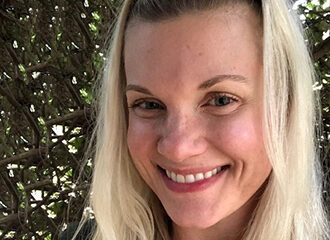Written by: Nancy Graham, LCSW
Professional Relations Representative, The Renfrew Center of Northern New Jersey
Outpatient eating disorder therapy is a common first step for those seeking treatment. In this post, we look at what to consider, and what to ask, when researching providers.
Seeking treatment for an eating disorder can be confusing and overwhelming with so many levels of care and types of treatment available. Often, the first step is to find an outpatient therapist – someone who provides a range of outpatient therapy services in a professional, accredited capacity. Outpatient services can include everything from comprehensive five-day-a-week structures to slightly less frequent intensive outpatient programs (IOP) to short-and long-term weekly support.
There are all different kinds of outpatient treatment providers. But finding the right one for you means doing a little bit of research and knowing what questions to ask. Here’s how.
10 Questions to Ask When Looking for an Outpatient Eating Disorder Therapist
- What is your experience and how long have you been treating eating disorders?
Not all therapists have experience or training in the treatment of eating disorders. Eating disorders are very complex which makes it important to find a provider who has specific expertise. - Do you belong to any professional organizations for eating disorder professionals?
There are several organizations for professionals who work with eating disorders such as the Academy for Eating Disorders (AED) and the International Association of Eating Disorders (IAEDP) as well as local eating disorder coalitions throughout the country. Membership or participation in these organizations indicates a commitment to learning more about treating these complex issues. - How would you describe your approach to treatment?
There are numerous treatment approaches, techniques and styles in outpatient therapy. It is important to find a therapist that you feel you can connect and collaborate with. Remember, the therapist/patient relationship is important, and you will feel more comfortable sharing your thoughts and feelings with someone you trust. - How do you treat coexisting mental health conditions such as depression or anxiety?
Eating disorders are about much more than food or the eating disorder symptoms. It is important to find a therapist who understands that the behaviors are driven by underlying emotions. Finding someone who can address the underlying maintaining factors is necessary for effectively treating an eating disorder. - Do you collaborate with medical providers, and will a medical evaluation be required at any time during treatment?
While eating disorders are psychiatric diagnoses, there can be serious medical symptoms present. It is important to have a therapist who understands the medical complexity and is willing to coordinate care with physicians. Medical stabilization or referral to a higher level of care may be needed depending on the presence of medical symptoms. - Do you collaborate with a Registered Dietician who has experience working with eating disorders?
A key member of an eating disorder treatment team is the dietician, and not all dieticians have experience with eating disorders. It is important to find providers who have experience in the nutritional complexities of eating disorders and are willing to collaborate as part of an outpatient treatment team. - Do you work with a psychopharmacologist if medication seems indicated?
Not everyone with an eating disorder requires medication but for some it can be helpful. It is important to know if a therapist has an established relationship with a prescriber with experience in eating disorders if medication is recommended. - Which, if any, insurance plans do you participate in and how do you handle billing?
Understanding the financial responsibility and commitment to therapy is an important factor when selecting a provider. Ask if a therapist participates in any insurance plans and if not, if there are procedures in place to access out of network benefits or if sliding scale fees are available. It can be beneficial to select a specialist, even if they are not in your network, to assure that you are getting quality eating disorder treatment. - How do you involve key family members or friends?
Eating disorders do not only affect the person struggling, but the family and social network too. It can be beneficial to include supports in the treatment process, whether to provide education or participate in therapy. Sometimes this may not be possible or clinically indicated so discussing with your therapist is important. - What if I need a higher level of care to stabilize my eating disorder? Do you collaborate with and refer to any specific eating disorder treatment centers?
While not everyone struggling with an eating disorder will require a higher level of care, it may be recommended depending on a variety of factors. Having a therapist with experience and relationships with treatment facilities can help make the decision and transition more comfortable.
At The Renfrew Center, we understand how important it is for patients to continue their journey to recovery at the time of discharge. For those who have an existing outpatient team, we will collaborate ongoing with the goal of transitioning care back at the time of discharge. For those who do not have an outpatient team, we will provide a list of outpatient providers who have eating disorder expertise in the community. The Renfrew Center provides numerous specialized aftercare groups throughout the country to support our patients in their recovery as well as a community of alumni, events and resources.
Conclusion
Making the choice to seek help can feel overwhelming but can also be empowering, leading you toward a more fulfilling life, free of the limitations and restrictions of an eating disorder. It is important to have the right team of experienced professionals to support you along the way. Ask questions and trust your intuition when it comes to selecting providers. Finding a ‘good fit’ can go a long way in your recovery journey.



